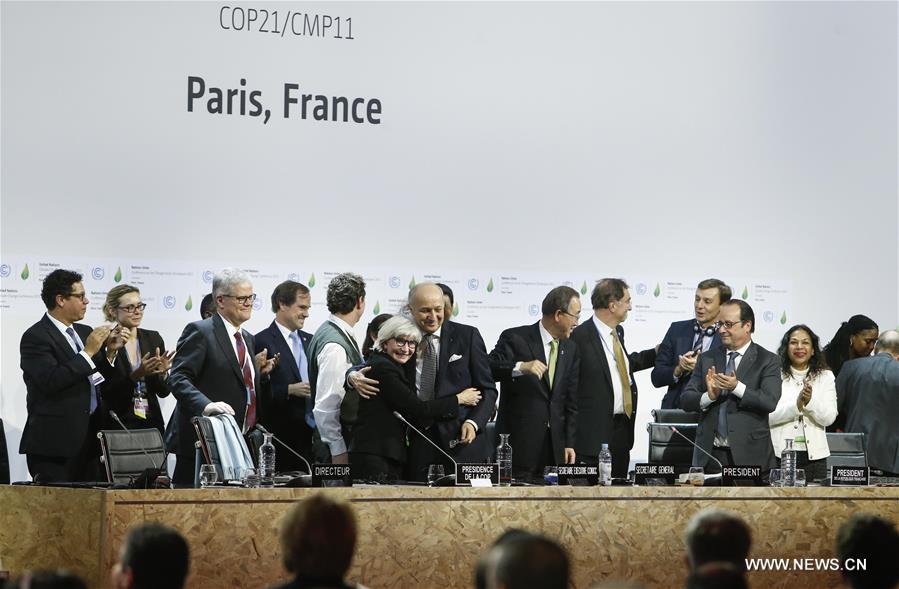

 |
| Photo taken on Dec. 12, 2015 shows the final conference at the COP21, in Le Bourget, Paris, Dec.12, 2015. The historic Paris agreement on climate change is finally adopted with no objection on Saturday by the 196 Parties of the United Nations Framework Convention on Climate Change (UNFCCC) during the 21st session of the Conference of the Parties (COP21) hosted by France. (Xinhua/Zhou Lei) |
BEIJING, Dec. 13 -- China's climate endeavors, including its self-imposed commitments and extensive diplomatic efforts before and during the Paris climate talks, have been an indispensable part of global efforts leading to the making of final breakthrough at the climate talks.
On Saturday, a historic climate agreement was reached at the Paris climate talks, virtually committing every nation for the first time ever to reducing greenhouse gas emissions that cause global warming.
However, significance of the Paris agreement can never be exaggerated as the "outcome has a bearing with the undertaking of climate change of the human being and our future of sustainable development," said Xie Zhenhua, China's Special Representative on Climate Change.
The Paris meeting is much looked to after years of wrangling-fraught U.N. talks and the fiasco of Copenhagen.
On the basis of equity and common but differentiated responsibilities, the Paris agreement aims to hold global average temperature rise to below 2 degrees Celsius above pre-industrial levels and strives for limiting the temperature increase to 1.5 degrees Celsius.
Taking into account of the needs and priorities of developing countries, the agreement also eyes financing support of 100 billion U.S. dollars a year by developed to developing countries from 2020.
The landmark agreement on climate change signed in Paris Saturday is "a new beginning in international cooperation" and is fair in splitting responsibility between developed and developing countries, according to a Chinese Foreign Ministry spokesperson.
Climate pledges are closely tied to a country's economic future, which makes it particularly hard for developing nations to improve the livelihood of people.
LEADING ROLE AS CLIMATE FIGHTER
China's status as one of the world's largest greenhouse gas emitters has always been hyped up in spite of its low per-capita emission rate which lags far behind the large array of developed countries.
However, the environmental woes and necessities to transform the country's economic growth mode increasingly prompt its policy makers to make efforts to address the issue of climate change.
Under a program of action submitted to the United Nations in June, China announced it aims to hit the CO2 emissions peak by around 2030 and slash CO2 emissions per unit of the Gross Domestic Product (GDP) by 60-65 percent from the 2005 level.
"As the largest developing country, China's efforts in climate change have 'spill-over' and 'model' effects globally," said Zhang Haibin, a professor with Peking University.
While taking bold actions and making progress in its own climate change fight, China has also taken an active part in international cooperation in combatting climate change and has provided assistance within its capabilities to other developing countries.
The country has inked a bunch of bilateral climate agreements with big emitters like the United States, France, India, Brazil and the European Union.
Over the years, China has earnestly fulfilled its policy commitments of South-South cooperation regarding climate change to support developing countries.
In Sept., China announced the establishment of an independent South-South cooperation fund of 20 billion yuan (3.1 billion U.S. dollars) to help developing countries affected by global warming.
China's recently reaffirmed pledge, made with the United States, on climate change mitigation and its domestic actions to curb emissions have helped build positive momentum in Paris, senior OECD climate policy analyst Jane Ellis told Xinhua.
"As a major player in three separate negotiation groups, namely G77/China, BASIC (Brazil, South Africa, India, China) and LMDC (Like-Minded Developing Countries), China has the power to bridge differences between these groups as well as between parties more broadly," Ellis said.
CHINESE ENDEAVOR AT PARIS MEETING
In strong signs of support for world's climate efforts, Chinese President Xi Jinping reiterated China's pledge to cut its carbon emissions per unit of the GDP by 60-65 percent from the 2005 levels by 2030 at the opening ceremony of the Paris climate summit.
He also pledged to increase non-fossil fuel sources in primary energy consumption to about 20 percent and peak its carbon emissions by the same date.
The Chinese delegation made extensive contacts with convening parties during the summit. Xie said he had consulted with U.N. Secretary-General Ban Ki-moon, ministers and heads of delegations from Malaysia, India, the United States and many other countries.
A seminar to share China's experience of transforming the Kubuqi Desert in north China into an oasis was organized on the sidelines of the meeting, offering valuable experience to other developing countries in this endeavor.
China has delivered its Intended Nationally Determined Contributions (INDC) with fundamental difference to many other countries in that it includes "mitigation and adaptation strategies and policies as well as specific measures, even several operational and specific projects," Xie said.
World Bank's vice president and special envoy for climate change Rachel Kyte also hailed the Chinese INDCs, saying it included a package of "hard" targets, such as emission peaking around 2030 and achieving non-fossil fuel share of 20 percent in the primary energy mix of by the same year.
In the most critical moments ahead of the finish line of the Paris meeting, Chinese President Xi and his U.S. counterpart Barack Obama held a telephone conversation Friday.
In the phone conversation, Xi said China and the United States need to strengthen coordination and work together with all parties to ensure that the historic conference could reach an agreement as scheduled.
The U.S. side is willing to maintain close coordination with China to promote achievement of success at the conference, Obama told Xi.
Day|Week

 Photos of Beijing Film Academy student hit the Internet
Photos of Beijing Film Academy student hit the Internet Spectacular aerial photos of the Three Gorges
Spectacular aerial photos of the Three Gorges New balls please! Polish sports stars strip off for risqué calendar
New balls please! Polish sports stars strip off for risqué calendar A glance at life of Ukrainian models working in Chongqing
A glance at life of Ukrainian models working in Chongqing Contestants of Mrs. Globe pose for photo in Shenzhen
Contestants of Mrs. Globe pose for photo in Shenzhen
 Bikini models attend hot pot banquet in Hefei
Bikini models attend hot pot banquet in Hefei 118-meter-high Never-used Building in NW. China Demolished
118-meter-high Never-used Building in NW. China Demolished J-10B fighters with homegrown engine in test flight
J-10B fighters with homegrown engine in test flight 10 tons of copper coins unearthed in 2,000 years old ancient tomb
10 tons of copper coins unearthed in 2,000 years old ancient tomb Beautiful graduate from police college becomes Internet hit
Beautiful graduate from police college becomes Internet hit